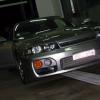Help With Wierd Distortion
Announcements
-
Similar Content
-
Latest Posts
-
By TurboTapin · Posted
I know -_- Oddly enough I went to a car show this weekend and not a single person made any mention of Nitrous... I did have to argue with a know it all that was convinced I had an RB26 head with HKS V-Cam as opposed to a regular VCT RB25 head, but what do I know. I think my HKS oil cap was throwing him off. -
By TurboTapin · Posted
That seems like a lot more work than just using a second jack under a front tow hook to raise it enough to get another jack under it. -
By TurboTapin · Posted
They're wonderful when only used to lift your car up an inch so a real jack fits under your front lip. Besides that, I've only ever used them on the side of the road. We call them widow makers here. Unfortunately, like I mentioned in another post, ramps are not an option for me due to generally working on my car once my kids are asleep. Cold starts, 4" exhaust and sleep rarely go well together. I honestly find using ramps a hell of a lot more work than what I'm currently doing anyways. -
Yeah, it's getting like that, my daughter is coming over on Thursday to help me remove the bonnet so I can install the Carbuilders underbonnet stuff, I might get her to give me a hand and remove the hardtop, maybe, because on really hot days the detachable hardtop helps the aircon keep the interior cool, the heat just punches straight through to rag top I also don't have enough hair for the "wind in the hair" experience, so there is that....LOL
-
By joshuaho96 · Posted
Could be falling edge/rising edge is set wrong. Are you getting sync errors?
-


1.thumb.png.36afd656b26d55f5d425fc76e21561f2.png)


Recommended Posts
Create an account or sign in to comment
You need to be a member in order to leave a comment
Create an account
Sign up for a new account in our community. It's easy!
Register a new accountSign in
Already have an account? Sign in here.
Sign In Now